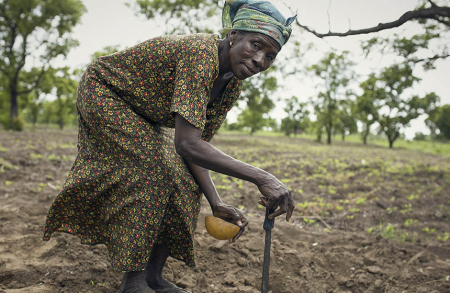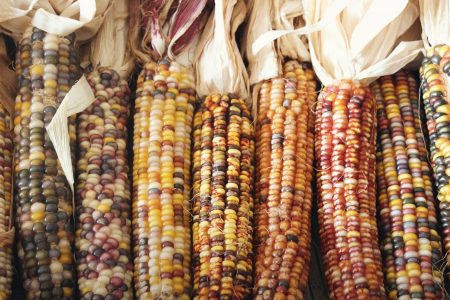Farmer Managed Natural Regeneration in Ghana

The Talensi District is located in the environmentally fragile dryland area of northern Ghana, where almost 80% of the population works in agriculture, fisheries and forestry. Climate change, land clearing and unsustainable agricultural practices are leading to declining agricultural productivity and vulnerability of already marginal rural populations in this region.
World Vision Ghana, together with World Vision Australia, implemented the 2nd phase of the Farmer Managed Natural Regeneration (FMNR) Project in the Talensi District between 2013 and 2017, involving 24 communities. FMNR is a low-cost, innovative technique to restore and regenerate trees from the stumps of previously cut-down (but still living) trees. The project goal was to restore hundreds of hectares of degraded land, countering the challenges of soil erosion and water retention.
In Talensi, farmers are trained to use FMNR to regenerate tress on farmers’ crop and pastoral fields; as well as in community managed FMNR forests, where tree densities were much higher than in crop fields. As farmers prune trees to stimulate natural regeneration, more leaves and branches from the pruning process are left on site, and they improve soil quality and reduce soil erosion. The project also trained farmers to adopt sustainable agriculture techniques such as bulk composting, field mulching and ox ploughing. It supported communities to adopt diversified income-generating activities including planting fruit trees, honey production and the establishment of community savings groups. The project facilitated the formation of community volunteer fire brigades to manage bushfires, reduce field burning and enhance natural regeneration. The project also facilitated community agreements and the establishment of community by-laws to limit tree cutting and reduce field burning.
An evaluation of FMNR was conducted in 2018, covering the implementation between 2009 and 2017, highlighting the strength of FMNR as an approach is that it links strongly with agriculture, food security and livelihoods:
- 96% of survey respondents reporting that they practised FMNR on their farms.
- 80% of farmers reporting an increase in the number of trees in the community.
- 94% of farmers managing the quality of their soil.
- 64% reporting an increase in soil fertility.
- communities had restored 718 hectares of degraded land.
- reporting of one or more hungry months per e year reduced from 87% at the project baseline to 63%.
- income source diversity increased from 56% at baseline to 95%.
- households belonging to a group increasing from 8% to 76% over the course of the project.
- households experiencing crop failure reduced from 49.8% to 38.4%
- households experiencing loss of main income reduced from 7.1% to 2.5%.
FMNR activities in Talensi combined short-term and long-term benefits, and were made accessible and easy to adopt by being very low cost and simple to apply, as well as being integrated with other
initiatives that helped to alleviate the poverty in the area. The FMNR approach has also strengthened community bonds and cohesion across the different groups and families participating in agricultural value chains. Such visible results mean that the environmental and economic benefits are expected to continue beyond the implementation window.
Learn more about the FMNR project in the full case study in our global online platform.




